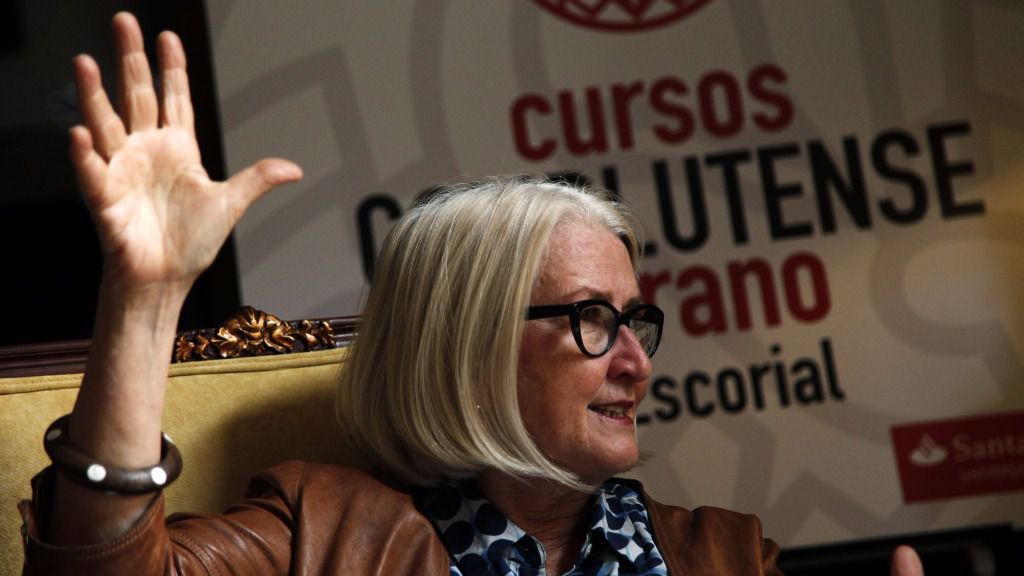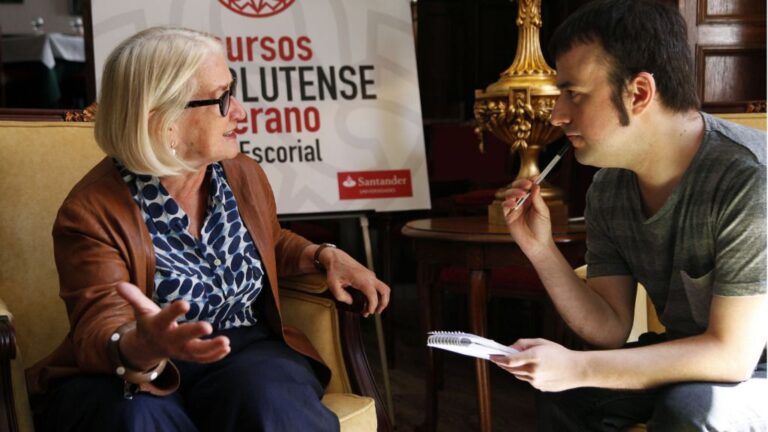In this last part of the interview that she held with EL BOLETÍN, from which have been previously published another two pieces; Ann Pettifor, member of the British Labour Party’s Economic Advisory Committee, reporting to Jeremy Corbyn, analyses the last elections and the perspectives for the United Kingdom.
Besides, Pettifor shares her impressions after taking part in the Universidad Complutense de Madrid (UCM) Summer Course held in San Lorenzo de El Escorial, which was sponsored by Podemos, «Transform the Economy, Transform Society».
Before, you have explained how people in these times of crisis tend to look for whoever seems to be a strong leader as could be in the case of Trump… In this sense, everybody was expecting a great result for May in the last UK elections… However, it didn’t go that way. Why?
I think the Brexit vote was our equivalent to the Trump vote. If you look at the voting pattern, the Leave vote was a vote of almost everybody who didn’t live in London, where everybody wanted to remain because they have higher wages, they are very cosmopolitan, etc. But for people outside of London the life is very hard. In our system, if you live in the North East in a poorer constituency, that has voted Labour for a hundred years, you vote Labour and it will make no difference. But in a referendum, if you voted against the government or for the Brexit you would make an impact. Suddenly, your vote counts.
And them it comes this election, and Jeremy Corbyn is not a strong man in the sense that Mrs. Lepen could be. He is a good man. People like him because he has no links to the City of London. He doesn’t have any bankers backing him. He’s just decent and honest and he is principled. We know he’s been against nuclear weapons all his life and he still find it hard to say that he will push the bottom. But what impressed me about the campaign was that what people voted for was the manifesto which was hugely popular. In Britain we are not used to manifestos being sexy and popular. What happened was rather foolishly because somebody leaked the manifesto to say: «oh, look at all his crazy policies». But people liked them and that showed that people are not stupid: they didn’t vote for the personalities, they voted for the policies. And they liked those policies: they like the NHS, they care about the education of their children, they want security, they want the police to be dealing with terrorism and they don’t want people to die in fires in a tower. The electors are very intelligent: They use the opportunity of the Brexit vote to kick the politicians in the teeth, basically; but this time they use the election as an opportunity to vote for policies.
The Conservatives’ policies were pretty awful, fox hunting and so on; but they didn’t invest very much in their manifesto ‘cause they also believed that manifestos didn’t matter and they just touched «strong and stable» and all that stuff. For me it’s a wonderful thing because we’ve got passed the Blairite era. Blair used to say: «Don’t worry about policies. Just give them soundbites. They will be decided by the television, not by policies». That’s very patronizing towards the electorate, and this election was an example that is very humbling because you understand that the electors are very, very intelligent.
A lot of people are already saying that the May’s government is a lame duck government and that we will have a new election soon… do you agree?
It’s a lame duck government, but one prediction I will make with some confidence is that we won’t leave the European Union.

How is that?
Well, there are two reasons why I believe that. Firstly, the bankers won’t let it happen. They’ve got a lot of money and are very powerful. Secondly, the Tory party is now tearing itself apart cause they are a coalition of the very wealthy and the not so wealthy. The Chancellor, Philip Hammond represents the City of London and powerful big corporate interests; and people like David Davies represents ordinary people who thinks that all this immigration is being bad for Britain and so on. And now the Tory Party is tearing itself apart and it doesn’t have enough power to keep united. May can’t unite the party now. She has been seen to support the Brexit side too much. So now there’s more pro Europe MPs in the conservative side. And if you add them with Labour party and with the Liberal Democrats there isn’t a vote for Brexit.
But Labour doesn’t have a very clear position about Brexit neither.
Yes, Labour is very ambiguous about Europe but as I was saying earlier, we are all ambiguous about Europe. We all think is a wonderful project, but we don´t like the division, the fact that the North is kicking the South. We find that unattractive. Why would you like to belong to a club with bullies in it? So everyone complained about the nature of the Labour campaign on being in Europe, but they reflect more realistically the views of the electorate. In this sense is more representative because the electorate is also ambiguous but now that debates have got deeper about the impact of coming out of the single market, they are changing their minds. That´s what we saw in the election campaign. That said there are many on the Labour benches that will vote with the proEuropean so I say we won’t leave.
But them, don’t you think, that this could generate a populist backlash against the main parties from all that people who wanted to show their anger through the Brexit vote?
For me the populist backlash is actually against globalization and not having controls over money, trade flows or immigration flows and just leave it to the market. You can´t do that. You have to manage even immigration. Is there enough housing for the immigrants? Is that housing decent? Many of the people that died in Grenfell Tower were immigrants. That’s not good enough. So there’s got to be management of this flows of labour, money and trade. You can’t just have chaos. So I think that the Brexit, Trump or a lot of the fascist votes in Europe is about that: there’s something out of control and our politicians tell us they can do nothing. So if they can’t do anything why do we elect them? And people go for somebody that will do something.
So do you think that there will be a second referendum?
We could have a second referendum. Or it could be also the Lords… Before this election the House of Lords had to go along with Mrs. May because of the referendum. Now she doesn’t have a mandate to do this. The House of Lords can block. But anyway we think the House of Commons will block as well, so get the legislation through will be extremely difficult.
But maybe, even in that case, the EU could say: «oh, sorry, too late».
Maybe. We are gonna have to mend fences and make friends again, but I think that there is too much economically at stake for both sides. The Germans sell a lot of cars in Britain. And Britain will have to change their attitude to Europe and stop being so arrogant and pushy and come here and lecture all the Europeans about how they should be. But I might be wrong. I’m only predicting this because I can see that the House of Commons doesn’t have the numbers to get the legislation through. The Europeans might reject us, but I have a feeling that there is too much at stake. For me the big issue is that we have the United States with Trump on the one hand, and we have China on the other and these are both societies which don’t share our human welfare values. We have more in common here than we have with the Americans or the Chinese.
We are seeing that the Tory party is broken but is Labour ready to be united this time?
That’s being fascinating to me. There is a wing of the Labour party called Progress, which is the Blairite wing, and they were financed by Lord Sainsbury, who is one of our millionaires. And last week he withdrew his 256.000 pounds that he gives to them every year. So they now have lost their major funder. So it’s not just that they’ve lost political influences; they are now losing money as well. So I think the Blairites are on the back foot and that they are going to be very humble. If you watched Glastonbury, Corbyn spoke to a vast crowd and them there were pictures of Ed Balls, who was the austerity Shadow Chancellor under the former’s leadership, and there he was standing in a queue for the lavatory by himself. So I think that tells you something about the fortunes of the two wings of the party. But what’s extraordinary is the number of people that have joined the Labour party. Suddenly, we have the highest membership of any political party in Britain and the Blairites are gonna have to think very hard about their policies and how the public view their policies. But I don’t think that we will have the divisions we had before the elections that were horrible. The day before the election, an exblairite MP came on to the television, Charles Clarke, and openly attacked Corbyn. When I was younger I was an activist, and in the old days, if you attacked the leadership, they will put you in jail virtually. It was considered to be a sin and for someone to do it the day before an election is like unbelievable and they have the nerve to do that. No more. Only because the media won´t interview them anymore. They don´t look at them as if they have any support.

Wouldn’t Jeremy Corbyn also need to change some things. I was shocked some months ago when all these resignations took place in the Council of Economic Advisors… Wren-Lewis, Blanchflower…
They all resigned because they blamed Corbyn for the fact that the referendum went for Brexit. I found that was outrageous. I don´t believe the prime minister should ever have called a referendum on such a complex issue. It was irresponsible. David Cameron was reckless, and the reason he did it was not because of the interest of the country, but for the interest of the Tory party because he had all this Brexiters chipping away at his heels, so to satisfy the Tory party they call a referendum and them they ran a terrible campaign. George Osborne said to the people: if you don´t vote to remain, we will double the austerity that you have. You can´t persuade people by threatening them. And them they lost the argument and the blame was put on Corbyn. So I would disagree with my colleagues Danny Blancheflower and Mariana Mazuccatto and Simon Wren-Lewis and I said I don´t think the campaign was particularly brilliant but to blame him when really this is a Tory party issue, it was tragic. And the biggest strategic error that the Blairytes made was to call for a new leadership election the day after the referendum. We saw the conservative party lying dead on the floor, leaders killing each other, stabbing each other on the back. At that moment, we turned our backs on them and we attacked our own leadership. And that was lead by an MP called Margaret Hodge. That was an extraordinary strategic error on the part of the Blairites, so them we had a painful, slow leadership election and meanwhile the tories recovered and we just ignored them. And the economic advisors made the same error: instead of focusing on where the fault layed, they blamed Corbyn.
I don´t wanna defend Corbyn’s leadership as being perfect. Far from it. There is much that I have to complain about the leadership of the Labour party, for example I think that they are very conventional when it comes to Economics. I think that they are quite conservative, I would like them to be bolder than they are and I would like them to pay attention to the finance sector, because they focus mainly on social issues. So I´m not defending them as being perfect; but in that environment, if you like to think of politics as war by other means, the enemy is hurting itself, they are all attacking each other and we don´t use that opportunity. So that´s the biggest mistake you can make in politics, so for the Blairites to recover from that, it´s gonna be very hard.
Could you go a little bit deeper into that? Which kind of economic policies would you like to see from Labour…
As you know I advise the Labour party and they like to talk about putting up taxes. And I say: «No, no, no, you don´t need to put up taxes. You know what you need to do. You need to increase employment and about all, you need to increase well paid skilled employment. Why? Because an employee that is payed well pays more taxes and that can pay down your debt». So the best way to increase taxes is by increasing wages and by increasing employment. In the Summer Course, I was listening to a Podemos member of Parliament (in Madrid’s regional parliament), Eduardo Gutiérrez, and he was telling us how shocking are the statistics here for the wages since they have fallen dramatically. That’s what’s hurting the government, as well as hurting the banks, as well as hurting the people. So this is like a self-inflicted wound on the government and on the banks. Never mind, the damage that is doing to young people, to the Spanish youth who don’t have work or a good work. This is a phenomenon that we have in Britain: our government boast that we have full employment but it means that young people are getting part time, unsecured, and in Britain we called them zero hour contract jobs. And their ambition is to become a barista, to be so skilled that they can deliver big coffee. Well, we would like our young people to have even higher ambitions than that. I appreciate a good coffee, but I want to see young people become architects and mathematicians and engineers and philosophers and artists.
So all this complains about the lack of coordination and efficiency from Jeremy Corbyn’s leadership were just noise or did they have any substance?
There was some substance to that, but the thing you need to know is that they had very little resources. I know from the treasury team that when they were elected and arrived to the Labour party offices in the House of Commons, all the computers had been taken by the old team. Petty little things like that. So they had to start from scratch and they have to start employing people and they had difficulties also with the Labour party HQ. So I´m not saying they could not have handle it better but it was tough. Now that they have a bigger share of the vote, they´ll get more money and they´ll become more efficient. So I think some of the criticism was unfair given the toughness of transition. Plus there was a lot of racism with the attacks on them which were really unreasonable with Diane Abbott and so on. I am not for a moment suggesting that they got it all together but what they have are the principles of decency, honest and the electorate is hungry for that kind of politicians.

Podemos in Spain has been compared to the Corbyn phenomenon and is even receiving very similar critics against them… you have shared a seminar with them, here in El Escorial… What are your views about this?
To be honest I know very little about intern politics of Podemos and I don’t want to comment on them because of that, but what impresses me is that they have these summer schools, that they take these issues seriously. Certainly the advisors do. I´m not so sure about whether the politicians are getting a grasp of the economics and of the finances and of the policies that are necessary to make Podemos successful. I think sometimes politics is just to sexy by itself and there is less interest in the hard graft of getting economic policies right, but what I have seen this week is the very seriousness in which they are addressing some of the economic issues and that encourages me but I can’t comment beyond that.













